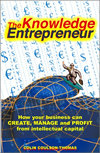 |
 |
|
 |
The Knowledge Entrepreneur
Article on Knowledge Management and Entrepreneurship
By Professor Colin Coulson-Thomas
Many management teams are missing exciting opportunities to transform
corporate performance by better exploiting know-how and using job support
tools to boost productivity. They are also forgoing unprecedented possibilities
for generating additional revenues from new knowledge-based offerings.
Scientific breakthroughs occur in laboratories and innovative thinking
abounds in workshops. Yet people drown in irrelevant information. They
waste time and money on ‘knowledge management’ initiatives
to capture and share existing know-how that may or may not be relevant
to future aspirations. With unexploited intellectual capital all around
them executives imitate and copy others.
Companies are adopting managerial rather than entrepreneurial approaches.
The focus is upon managing what is currently known, rather than creating
new information and knowledge-based services, tools, ventures and businesses.
Most knowledge management processes are missing an explicit knowledge
exploitation stage.
Yet we stand at the threshold of a new management revolution. There is
simply enormous potential for knowledge entrepreneurship, performance
improvement and developing the additional knowledge needed to deliver
greater customer and shareholder value.
Most organisations and executives are barely scratching the surface. A
new book ‘the knowledge entrepreneur’* examines processes
and practices for exploiting knowledge and highlights the scope for both
improving the performance of existing operations and creating new knowledge-based
products and services.
We need to step up from information management to knowledge entrepreneurship.
There is an urgent requirement for knowledge entrepreneurs who know how
to acquire, develop, package, share, manage and exploit information, knowledge
and understanding and introduce related job support tools.
A new generation of practical support tools (see www.cotoco.com) incorporating
critical success factors for competing and winning promise dramatic improvements
in both understanding and achievement. The experiences of an A B C D E
F of companies as varied as Avaya, B&Q, Cisco, Dana, Eyretel and Friends
Provident suggest they represent the next ‘big idea’ in management.
These pioneers have used knowledge-based support tools to transform business
win rates, launch new products and build supply chain quality. They can
enable greater delegation and more bespoke responses in complex and regulated
areas.
In relation to winning business, returns of over 20 times an initial investment
have been quickly achieved. In addition to higher success rates, orders
have been brought forward and dramatic reductions have been made in the
number of specialist support staff required to accompany sales teams in
the field.
Overall, much greater effort needs to be devoted to knowledge creation
and exploitation. Directors and senior executives should assess the scope
for knowledge entrepreneurship, and consider steps they might take to
create and enable a community of knowledge entrepreneurs and stimulate
and launch new knowledge-based ventures.
Individual business executives should endeavour to be role models when
learning and sharing information, knowledge and understanding. They should
understand the key requirements for success in the knowledge society and
information age. Many boardroom and meeting room discussions would be
enlightened by the presence of one or more knowledge entrepreneurs.
Many companies operate in sectors in which know-how accounts for an increasing
proportion of the value being generated for customers. Yet they lack an
explicit strategy for obtaining, developing, sharing and exploiting know-how.
Corporate culture, policies, processes and practices should all be supportive
of knowledge entrepreneurship.
Business executives need to ensure effective acquisition, development,
sharing and exploitation of information, knowledge and understanding occurs
within the areas for which they are responsible, and that their people
are supported with appropriate knowledge based tools.
A designated person should be made personally accountable for corporate
effectiveness at acquiring, creating, sharing and exploiting knowledge.
Specific opportunities need to be assessed and important workgroups equipped
with the support tools they need to do their jobs and achieve their objectives.
Just providing people with relevant knowledge may not be sufficient. They
may also require tools to help them use and apply it. Practical knowledge-based
tools can transform workgroup productivity by increasing understanding,
communicating best practice and sharing the essence of how superstars
operate.
There is little excuse for further inaction. ‘The Knowledge Entrepreneur’
provides lists of possible commercial ventures, along with detailed checklists
for identifying and analysing opportunities, exercises for assessing entrepreneurial
potential and ‘scoping’ possible knowledge-based services,
and guidance on using support tools.

Professor Colin Coulson-Thomas |
About the Author:
Professor Colin Coulson-Thomas
is an experienced chairman of award winning companies and consultant.
He has advised over 80 boards on how to improve board and corporate
performance, leads the world's largest winning business research
and best practice programme, and has reviewed the processes and
practices for winning business of over 50 companies.
Following marketing and general management roles Colin became the
world's first Professor of Corporate Transformation and more recently
Process Vision Holder of major transformation projects. He is the
author of over 30 books and reports, including ‘Individuals
and Enterprise’ (Blackhall Publishing, 1999), 'Shaping Things
to Come' (Blackhall Publishing, 2001), 'Transforming the Company,
Manage Change, Compete and Win' (Kogan Page, 2002 and 2004)
and ‘The Knowledge Entrepreneur’(Kogan Page,
2003). Colin has spoken at over 200 national and international conferences
and corporate events in over 20 countries. He can be contacted:
Tel: 01733 361 149
Fax: 01733 361 459
Email: colinct@tiscali.co.uk
Web: www.ntwkfirm.com/colin.coulson-thomas
|
|
Transforming the Company: Manage Change, Compete & Win
Colin Coulson-Thomas shows that to bridge the gap between rhetoric
and reality, business people must make far-reaching decisions about
the value to them and their companies of particular theories, past
assumptions and traditional approaches. Based on original research,
the first edition of this was ahead of its time and predicted many
of the current management trends. The author now brings the text bang
up-to-date for the 21st century. This second edition of Transforming
The Company shows how to turn theory into practice by highlighting
the obstacles and barriers that confront companies when trying to
bring about change. For management at all levels faced with this task,
this thought-provoking book will inspire and enlighten. |
| 
Buy
UK Buy
US
|
The Knowledge Entrepreneur: How Your Business Can Create,
Manage and Profit from Intellectual Capital
In many companies knowledge management has focused almost exclusively
upon the packaging of existing knowledge. This book is designed
to help readers boost revenues and profit by significantly improving
the performance of existing activities and also creating new offerings
that generate additional income. It shows how practical knowledge-based
job-support tools can transform work group productivity, and reveals
the enormous scope for addressing contemporary problems such as
"information overload" with imaginative responses. Additional
information includes: a list of possible commercial ventures; detailed
checklists that can be used for identifying and analysing opportunities
for knowledge entrepreneurship; and exercises for assessing entrepreneurial
potential and "scoping" possible products and services.
The free CD-ROM packaged with the book gives examples of particular
knowledge-based job support tools that have dramatically improved
desired results in crucial areas such as winning more business.
|

top of page |
 |
